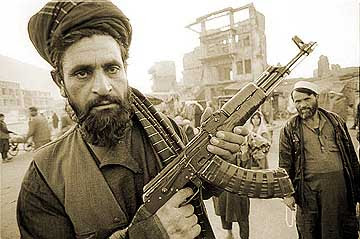 Hassan Abaas (his other article), author of Pakistan: drifting into extremism, writes that taliban forces and their sympathizers are becoming entrenched in the region and are aggressively expanding their influence and operations (especially in Tank, Dera Ismail Khan and Swat Valley in the North-West Frontier Province).
Hassan Abaas (his other article), author of Pakistan: drifting into extremism, writes that taliban forces and their sympathizers are becoming entrenched in the region and are aggressively expanding their influence and operations (especially in Tank, Dera Ismail Khan and Swat Valley in the North-West Frontier Province).Pakistan will predictably revert to "peace deals" in the short-term, leading to a lowering of the number of military checkpoints in the area.
Hassan further explains that the factors that "limit" Pakistan's effective clampdown on all things Taliban in FATA remain linked to its fear about increasing Indian influence in Afghanistan if the Taliban are comprehensively defeated, and the lack of Pakistani public support for anything that appears to be done in pursuance of the U.S.-led global war on terrorism.
Hassan looks at all 7 tribal agencies (Map of FATA) that form FATA. He writes that Bajaur Agency is considered a stronghold of Tehreek-e-Nafaz-e-Shariat-e-Mohammadi (TNSM) and Jamaat-e-Islami (JI) units, and the Jamiat-e-Ulema-e-Islam (JUI) has representation in parliament from Bajaur (Daily Times, February 13, 2006).
 He explains that Taliban, in order to show their control, have been successful in enforcing, in some agencies, following things:
He explains that Taliban, in order to show their control, have been successful in enforcing, in some agencies, following things: 1. Friday as the weekly holiday
1. Friday as the weekly holiday
2. Taliban-sponsored rumor that the Pakistani government-run polio vaccination drive was a U.S. plot to sterilize Muslim children
3. binding on all men of the agency to wear caps.
4. banning music
5. warned tailors to strictly observe religious codes while sewing clothes for men and women
Furthermore, Pakistan has been rattled by 39 suicide attacks in 2007, so far killing around 350 people, and most of these attacks targeted the Pakistani army, the Frontier Corps and government officials in FATA and the NWFP.
Indeed, Musharraf's capacity to respond militarily is curtailed because of political compulsions. For Afghanistan and the United States, this means a troublesome scenario. Pakistan's return to democracy may potentially change things for the better, but Musharraf's move in this direction is sluggish and uncertain. Full Report
Hassan Abbas Blog (click here)
No comments:
Post a Comment